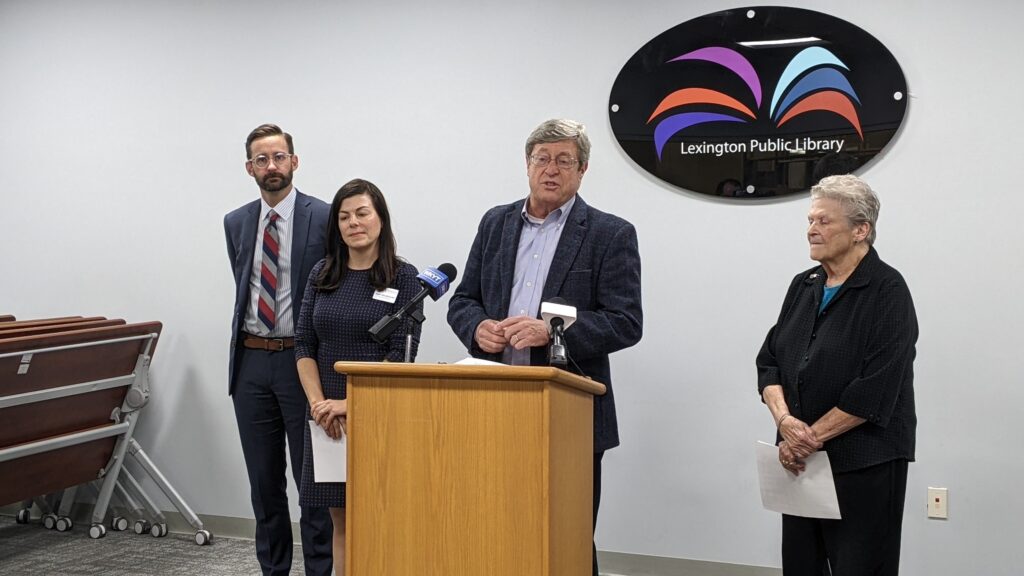Health advocates say Amendment 2 would take money away from public education and health-related support programs

By Melissa Patrick
Kentucky Health News
Health advocates gathered in Lexington Wednesday to voice strong opposition to Amendment 2, saying, if passed, it would divert money away from much needed school-based health and nutrition programs that are proven to improve student outcomes.
Amendment 2 is a question on next month’s ballot that asks whether voters want to change Kentucky’s constitution to allow public tax dollars to be allowed to go to private schools.

“Why is this a health issue, you might ask? Well, because education is one of the most significant predictors of health outcomes.” said Ben Chandler, president and CEO of the Foundation for a Healthy Kentucky.
“People with more education live longer, healthier lives. They are more likely to access quality health care, secure well paying jobs, and it affords them the opportunity to live in healthier environments,” he said. “This is why it’s critical that every child is able to receive a quality education, and a properly funded public school system is the only way to guarantee this access for all kids, and not just a few.”
Chandler said the passage of Amendment 2 would allow state legislators to divert public funds to private schools through mechanisms such as vouchers, education savings accounts and scholarship tax credits.
“And while we may not know exactly what the implementation would be, it would likely result in resources being drained away from our already underfunded public schools,” he said.
Advocates for the amendment say it will improve education by making it possible for parents to have a choice in deciding where to send their children to school.

Disability impacts
Sheila Schuster, representing the Kentucky Mental Health Coalition and the 874K Disabilities Coalition, said she was particularly concerned about the amendment’s impact on student’s with disabilities.
She said the Kentucky Department for Education reports that one in six students have a disability of some kind that required specialized services in the 2022-23 school year.
“Those 109,749 students, who would fill Rupp Arena five times over, have rights under federal law, rights that require public schools to provide certain services and accommodations that these students need to reach their full potential, but those same rights are not required or guaranteed in private schools,” said Schuster, a licensed psychologist.
Schuster also noted that private schools can hand pick their students and that research out of the University of Kentucky shows this is happening.
“Since private schools are not required to follow state and federal anti-discrimination regulations that protect students with disabilities, these schools can cherry pick students that they choose to enroll in states with vouchers,” she said.
Food insecurity impact
Dustin Pugel, policy director for the Kentucky Center for Economic Policy, talked about the critical role public schools play when it comes to food insecurity, noting that school funds are needed to supplement federal funding used to provide free breakfast and lunch to all students in the 550 Kentucky schools that participate in the Community Eligibility Provision program.
“Reducing state funding for public education because of a voucher program would jeopardize schools’ ability to provide that service,” he said.
Why is this important? Research shows that school meals improve student health, including obesity rates and behavioral and mental health outcomes. School meals have also been shown to improve academic performance, including reduced tardiness, fewer disciplinary problems and improved math and reading test scores, Pugel said.
“Siphoning money away from public schools to provide tax-funded voucher programs for private education not only creates a two-tiered education system, but it also widens the hunger gap that we’ve faced as a commonwealth for all too long,” he said. “Let’s keep kids healthy and fed by saying no to Amendment 2 this November.”
Health care impact
Emily Beauregard, director of Kentucky Voices for Health, said diverting money away from public schools to private could result in substantial financial losses that could impact funding for school-based health programs — where many of the state’s children get their health care.
She implored Kentuckians to think about how these budget cuts would impact school’s health programs, including school nurse programs, health screenings, counseling and mental health services.
“Public schools provide the best and most consistent access to health care, and this matters because healthy students are better learners, and better learners will grow up to have better health outcomes,” she said.
Other concerns
To the argument that Amendment 2 allows parents more choice in where their children can go to school, Chandler and Beauregard pointed out that a voucher program that allows tax dollars to go to private schools does not create equity of choice.
“Vouchers rarely cover the full tuition for a private school, making them less accessible to low-income families,” Chandler said.
Beauregard added, “We know that simply handing a school voucher to a family that is structurally impoverished isn’t the solution. As you would expect, similar programs in other states mostly benefit wealthier families already enrolled in private schools. In fact, the majority of voucher users in other states have never attended a public school in the first place.”
Chandler and Pugel talked about how diverting tax dollars to private schools would hit rural communities the hardest.
“We know in over half of counties in Kentucky, there are no private options, and their budgets are still going to get reduced,” Pugel said. “So it’s our rural counties in particular that are harmed by this.”
Asked why moving money to private schools is a problem since it would result in fewer kids in public schools to pay for, Pugel said no matter how many students are in the school the fixed costs, like building maintenance and staffing, will remain the same and schools would have less money to pay for those costs, adding “So you have to stretch a small amount of money further.”